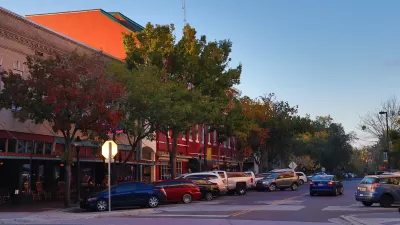A see-saw battle over land use and housing policy continues in the city of Gainesville.

Gainesville, Florida is in the final stages of planning and discussion on an ordinance that would implement mandatory inclusionary zoning in the city.
“The outline [of the proposed ordinance] presented to the plan board in June would require 10% affordable units for all developments with 10 or more units,” reports Seth Johnson for Main Street Daily News. “So, a developer proposing a 200-unit complex would set 20 units aside as affordable. The city could compensate by then allowing the developer to build extra units, taking the development above 200 units.” Gainesville has approved developments with inclusionary zoning already, but only on a voluntary basis, adds Johnson.
The debate is occurring just a few months after reversing a decision to replace the city’s single-family zoning with “neighborhood residential zoning.” The zoning change would have allowed more multi-family residential buildings in the city.
The same study that produced that previous effort at zoning reforms is also responsible for the current inclusionary zoning proposal, according to the article, “The City Commission hired a firm to conduct a housing study that finished at the end of 2021. That study looked at both inclusionary and exclusionary zoning, directly leading to last year’s vote to end single-family zoning. With that decision reversed, the city can set its sights on inclusionary zoning and other housing changes,” writes Johnson.
The report, completed by HR&A Advisors, is available to read online.
FULL STORY: Gainesville considers inclusionary zoning

Alabama: Trump Terminates Settlements for Black Communities Harmed By Raw Sewage
Trump deemed the landmark civil rights agreement “illegal DEI and environmental justice policy.”

Planetizen Federal Action Tracker
A weekly monitor of how Trump’s orders and actions are impacting planners and planning in America.

Why Should We Subsidize Public Transportation?
Many public transit agencies face financial stress due to rising costs, declining fare revenue, and declining subsidies. Transit advocates must provide a strong business case for increasing public transit funding.

Understanding Road Diets
An explainer from Momentum highlights the advantages of reducing vehicle lanes in favor of more bike, transit, and pedestrian infrastructure.

New California Law Regulates Warehouse Pollution
A new law tightens building and emissions regulations for large distribution warehouses to mitigate air pollution and traffic in surrounding communities.

Phoenix Announces Opening Date for Light Rail Extension
The South Central extension will connect South Phoenix to downtown and other major hubs starting on June 7.
Urban Design for Planners 1: Software Tools
This six-course series explores essential urban design concepts using open source software and equips planners with the tools they need to participate fully in the urban design process.
Planning for Universal Design
Learn the tools for implementing Universal Design in planning regulations.
Caltrans
Smith Gee Studio
Institute for Housing and Urban Development Studies (IHS)
City of Grandview
Harvard GSD Executive Education
Toledo-Lucas County Plan Commissions
Salt Lake City
NYU Wagner Graduate School of Public Service





























